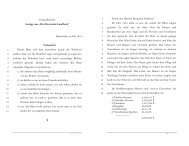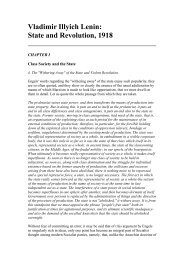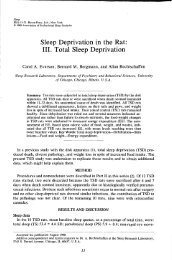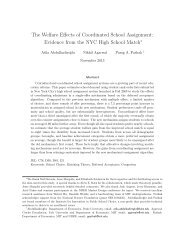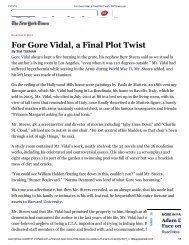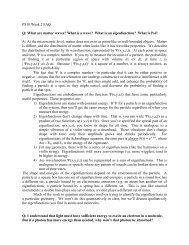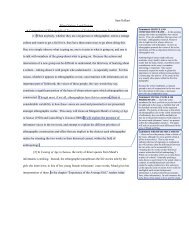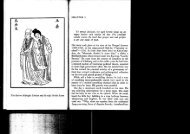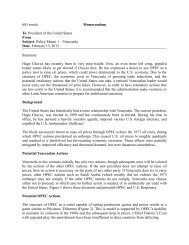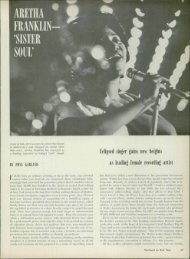What Did You Do in the War, Mutti? Courageous Women ... - iSites
What Did You Do in the War, Mutti? Courageous Women ... - iSites
What Did You Do in the War, Mutti? Courageous Women ... - iSites
You also want an ePaper? Increase the reach of your titles
YUMPU automatically turns print PDFs into web optimized ePapers that Google loves.
566 Robert G. Moeller<br />
with o<strong>the</strong>r sources, <strong>in</strong>clud<strong>in</strong>g, but by no means limited to contemporary film<br />
review, films can illum<strong>in</strong>ate larger social and political trends <strong>in</strong> <strong>the</strong> Federal<br />
Republic a decade after <strong>the</strong> end of <strong>the</strong> Second World <strong>War</strong>.<br />
The Text<br />
First, <strong>the</strong> film. KMG was a film adaptation of a popular page-turner by<br />
Herbert Re<strong>in</strong>ecker who made a liv<strong>in</strong>g churn<strong>in</strong>g out melodramas <strong>in</strong> a different<br />
key under <strong>the</strong> Nazis. Without los<strong>in</strong>g a beat he emerged <strong>in</strong> <strong>the</strong> 1950s, ply<strong>in</strong>g<br />
his trade for <strong>the</strong> mass market <strong>in</strong> a democratic, not a fascist, Germany.<br />
Re<strong>in</strong>ecker, whose works <strong>in</strong> <strong>the</strong> early 1940s <strong>in</strong>cluded Panzer nach vorn!, <strong>the</strong><br />
stirr<strong>in</strong>g story of <strong>the</strong> triumphant Wehrmacht heroes who rolled over Poland,<br />
and Pimpfenwelt (World of [Nazi] <strong>You</strong>th), 7 was ready by <strong>the</strong> early 1950s to<br />
‘get rid of heroism’: Hau ab mit dem Heldentum was <strong>the</strong> title of <strong>the</strong> serialized<br />
story first published <strong>in</strong> QUICK, a weekly illustrated magaz<strong>in</strong>e with a circulation<br />
of 685,000; <strong>the</strong> story became a more prosaic KMG when it appeared as a<br />
novel <strong>in</strong> 1953. 8 Re<strong>in</strong>ecker was <strong>the</strong> screenwriter for <strong>the</strong> film version.<br />
The film’s producer was Erich Pommer, known to film aficionados as <strong>the</strong><br />
organizational <strong>in</strong>spiration responsible for such films as The Cab<strong>in</strong>et of<br />
<strong>Do</strong>ctor Caligari and The Blue Angel and a driv<strong>in</strong>g force beh<strong>in</strong>d <strong>the</strong> German<br />
‘art film’ of <strong>the</strong> 1920s. Pommer had chosen to sojourn for about a year <strong>in</strong><br />
Hollywood <strong>in</strong> 1926 and returned <strong>in</strong>voluntarily to <strong>the</strong> United States <strong>in</strong><br />
1933 when it became undeniably clear that as a Jew he would f<strong>in</strong>d little work<br />
with Ufa, <strong>the</strong> big German film production company to which he had contributed<br />
so much <strong>in</strong> <strong>the</strong> previous decade. Pommer was <strong>in</strong> Germany once<br />
more <strong>in</strong> 1946, this time as an American citizen <strong>in</strong> an army uniform, charged<br />
with help<strong>in</strong>g to rebuild <strong>the</strong> German film <strong>in</strong>dustry <strong>in</strong> <strong>the</strong> American zone of<br />
occupation. A decade later—now as a civilian—he was still <strong>the</strong>re, look<strong>in</strong>g<br />
for good stories that would draw big audiences and potentially attract foreign<br />
distributors. Pommer was unwill<strong>in</strong>g to work with former Ufa directors<br />
who had served Goebbels, and for KMG he enlisted <strong>the</strong> Hungarian expatriate<br />
Laslo Benedek, who had also established a name <strong>in</strong> Hollywood.<br />
Benedek’s credits <strong>in</strong> America <strong>in</strong>cluded a well-received film version of Arthur<br />
Miller’s Death of a Salesman and The Wild One with Marlon Brando. The<br />
Berl<strong>in</strong> daily Der Tagesspiegel put Benedek <strong>in</strong> <strong>the</strong> elevated company of Vittorio<br />
de Sica, Billy Wilder, and Max Ophuls, prais<strong>in</strong>g him as a director<br />
7 Herbert Re<strong>in</strong>ecker, Panzer nach vorn! Panzermänner erzählen vom Feldzug <strong>in</strong> Polen (Berl<strong>in</strong>, 1940);<br />
Re<strong>in</strong>ecker, Pimpfenwelt (Berl<strong>in</strong>, 1940).<br />
8 Herbert Re<strong>in</strong>ecker, K<strong>in</strong>der, Mütter und e<strong>in</strong> General (Darmstadt, 1953). Circulation figures for<br />
QUICK are from Alex Schildt, Moderne Zeiten: Freizeit, Massenmedien und ‘Zeitgeist’ <strong>in</strong> der Bundesrepublik<br />
der 50er Jahre (Hamburg, 1995), p. 130. Accord<strong>in</strong>g to public op<strong>in</strong>ion surveys, about<br />
one-fifth of <strong>the</strong> West German population saw QUICK or Stern, a competitor with a circulation<br />
of 328,000, on a weekly basis.





